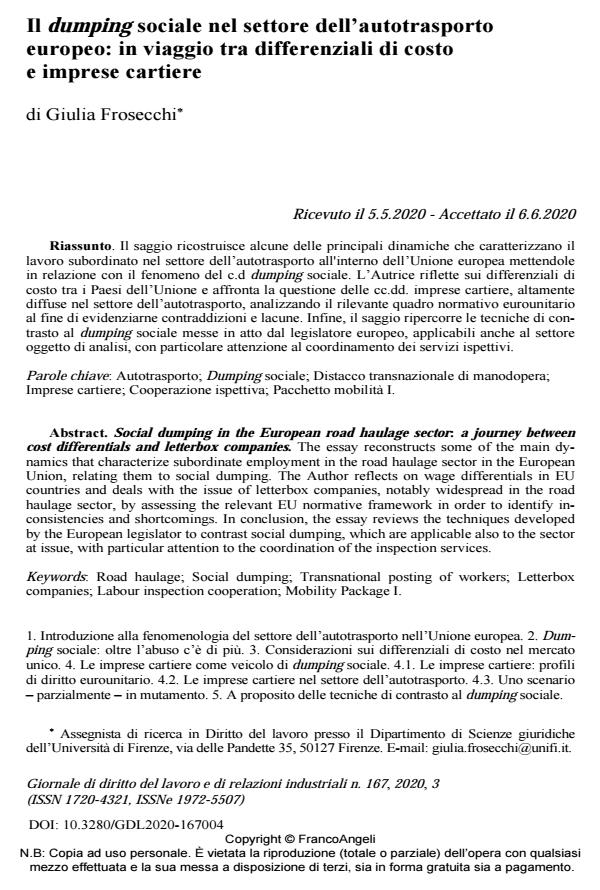Il dumping sociale nel settore dell’autotrasporto europeo: in viaggio tra differenziali di costo e imprese cartiere
Titolo Rivista GIORNALE DI DIRITTO DEL LAVORO E DI RELAZIONI INDUSTRIALI
Autori/Curatori Giulia Frosecchi
Anno di pubblicazione 2020 Fascicolo 2020/167
Lingua Italiano Numero pagine 28 P. 543-570 Dimensione file 438 KB
DOI 10.3280/GDL2020-167004
Il DOI è il codice a barre della proprietà intellettuale: per saperne di più
clicca qui
Qui sotto puoi vedere in anteprima la prima pagina di questo articolo.
Se questo articolo ti interessa, lo puoi acquistare (e scaricare in formato pdf) seguendo le facili indicazioni per acquistare il download credit. Acquista Download Credits per scaricare questo Articolo in formato PDF

FrancoAngeli è membro della Publishers International Linking Association, Inc (PILA), associazione indipendente e non profit per facilitare (attraverso i servizi tecnologici implementati da CrossRef.org) l’accesso degli studiosi ai contenuti digitali nelle pubblicazioni professionali e scientifiche.
Il saggio ricostruisce alcune delle principali dinamiche che caratterizzano il lavoro subordinato nel settore dell’autotrasporto all'interno dell’Unione europea mettendole in relazione con il fe-nomeno del c.d dumping sociale. L’Autrice riflette sui differenziali di costo tra i Paesi dell’Unione e affronta la questione delle cc.dd. imprese cartiere, altamente diffuse nel settore dell’autotrasporto, analizzando il rilevante quadro normativo eurounitario al fine di evidenziar-ne contraddizioni e lacune. Infine, il saggio ripercorre le tecniche di contrasto al dumping so-ciale messe in atto dal legislatore europeo, applicabili anche al settore oggetto di analisi, con particolare attenzione al coordinamento dei servizi ispettivi.
Parole chiave:Autotrasporto; Dumping sociale; Distacco transnazionale di manodopera; Im-prese cartiere; Cooperazione ispettiva; Pacchetto mobilità I.
- Lo sfruttamento dei lavoratori nelle catene di appalto Silvia Borelli, Giovanni Orlandini, in GIORNALE DI DIRITTO DEL LAVORO E DI RELAZIONI INDUSTRIALI 173/2022 pp.109
DOI: 10.3280/GDL2022-173005 - Posted workers La condizione dei lavoratori in distacco transnazionale in Europa Silvia Borelli, (ISBN:978-88-6969-516-2)
- In Search of the Notion of "Posted Worker": Some Clarifications from the Court of Justice Starting from the International Transport Sector Costantino Cordella, in Eastern European Journal of Transnational Relations /2021 pp.49
DOI: 10.15290/eejtr.2021.05.02.04
Giulia Frosecchi, Il dumping sociale nel settore dell’autotrasporto europeo: in viaggio tra differenziali di costo e imprese cartiere in "GIORNALE DI DIRITTO DEL LAVORO E DI RELAZIONI INDUSTRIALI " 167/2020, pp 543-570, DOI: 10.3280/GDL2020-167004